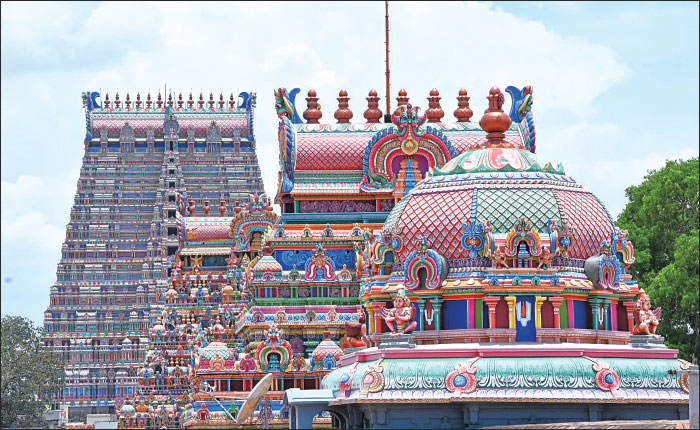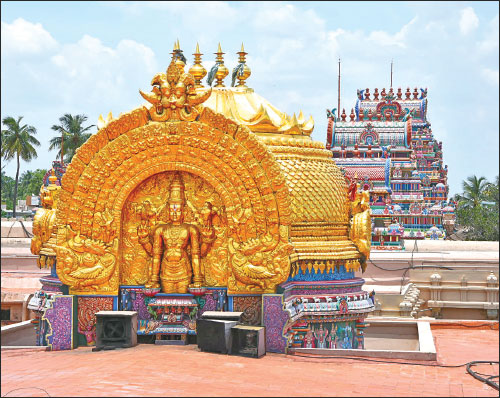03Rangarajyam
Posted Date : 06:00 (08/05/2018)
May 8, 2018
Indira Soundarrajan
N.G. Manikandan
The king of Ayodhya Ikṣvāku listened to Kula
Guru Vasiṣtar to perform Tapas (= Austerity) for a noble and lofty
cause. He shed his crown, his jewels, his protective gear (cuirass or
body armor) …, wore tree barks and immersed himself in Tapas in the
riverside hermitage by Surabhi river.
Though no one understood the reason for his
Tapas, the country was stunned to note his abandonment of royal luxuries
and adoption of a life of a Tapasvin. When the subjects discovered the
reason from Vasiṣtar for the king’s Tapas, it amazed them inordinately.
They were happy to learn that their king took to Tapas on their behalf.
Tapas = Tapasya = Austerity, Asceticism.
Ikṣvāku’s desire was something not realized by
the world thus far: there were no selfish desires such as a Perennial
river, long life, and reign under one umbrella. What he wanted was his
country should have Praṇavākāra Vimāṇam
with the resident god, to whom the people of the world can offer
worship, and attain liberation. (The
Om-shaped Dome housing the god)
The whiff of Ikṣvāku’s plan traveled by divine
grapevine and had its unwelcome impact in Satyaloka. Even Brahma was
surprised (and shocked) at the beginning. Brahma took into the account
Vivasvāṉ and his administration, his son reigning the world, and his
desire to obtain Praṇavākāra Mūrthy himself for his worship. Brahma was
angry to learn of Ikṣvāku’s attempt to obtain Praṇavākāra
Mūrtham (God).
Brahma called Vivasvāṉ and his father Surya and inquired.

“Vivasvāṉ! Your son’s desire in the world is
uncommon (unwelcome and contradicts my interests).” Vivasvāṉ maintained
silence even before Brahma’s question.
“Out with the answer, Vivasvān. Your silence
is deafening. How am I to interpret your silence?”
“My Lord! What kind of a reply can I give you?
You are omniscient. Is there anything unknown to you, the creator of
all.”
"Since I know it, I am posing the question. In
what ways could it be right for Ikṣvāku to desire for Praṇavākāra
Peruman whom I worship every day? This idea dawned on him because of
you.”
“Yes! The thought of Emperuman fell as a seed
in Ikṣvāku because of me. I cast the seed in him when he was an infant.
He was devout. My dear Emperuman, I never knew this seed would grow into
a tree.”
“If that is so, cut down that tree yourself.
Degrade and destroy your son’s Tapas.”
“Ayaṉē! Is this you talking?” Ayaṉē = O Brahma
“Vivasvāṉ! No deed without cause. (No good
deed goes unpunished.) You must understand it. What remains there, must
remain there. We can accept the performance of Tapas to receive Darśan
of Mūrthy. The desire to own the Darśan-worthy Mūrtham is his
transgression.” Mūrtham = God's image, form.
“I understand you, Prabhō! I will attempt to
act according to your wish.” Saying so, Vivasvāṉ appeared before Ikṣvāku
immersed in Tapas. (Vivasvan left Brahma's immediate vicinity and
appeared before Ikṣvāku in a matter of nanoseconds.)
Ikṣvāku’s simple Sannyasa guise and gear
(simple loincloth) induced surprise and perplexity in Vivasvān.
In general, Tapas is the supreme act among
human endeavors. A man shouldering the weight of Tapas with his mind is
like a woman nurturing and housing a fetus in the womb. To abort a
fetus is a sin. Likewise, to degrade and destroy Tapas is a sin.
Vivasvāṉ was wont to teaching Sastra Dharmas
to the world. Thinking of those Sastra Dharma principles, he stood there
hesitating to degrade and destroy his son’s Tapas. He thought to
himself, “One who wanted a flowering plant now wants the whole flower
garden. My son is like that. Now only I realize your
Vairagya.” He
stood before his son remaining in the guise of a Tapasvin but soon left
to visit with Kula Guru Vasiṣtar.
Vairagya =
Freedom from worldly desires, asceticism.
“O Mahaṛṣi! You are the reason my son Ikṣvāku
became a Tapasvin.
“True, Manu Prabhu. However, the first reason
is the Mūrtham Itself (God Himself). Second, you spoke of its greatness.
I am the third reason, said Vasiṣtar. Mūrtham
= That which has Form, Figure, Shape or
Body.
“It is possible, Brahmadeva. It comes to me as
a surprise if a Tapas must sustain destruction. It is a great surprise
indeed.”
“Surprise or shock… He is my master. I must
carry out his order.”
“That too is right. I will not tell you who
codified (and popularized) all the principles Dharma. I won’t be
presumptuous to lecture you on what you don’t know. There is nothing in
this world higher than Tapas. Life is all movement. Abandoning the
frenetic activity, Tapas is a life not lived (as we know). To destroy it
is a sin, esp. for the codifier of Dharmic principles. Won’t it be wrong
to violate Dharma and set that perversion as a corrupt example (for all
to behold and follow)? Vasiṣtar stopped questioning Vivasvāṉ.
“True it is, Mahaṛṣi! What you said is a Great
Truth. How could a pathfinder (creator-sage) break his creation? To
transgress is Adharma.
“If that is so, what do you propose to do?

“There is no way other than to seek
forgiveness from my master.
No matter what, you have no more business
here. Scoot!” Vasiṣtar pointed his hand towards the heavens.
Thinking of Ikṣvāku in his mind, he said to
himself, “The ordeal has begun. Will Brahma control himself or again
control you? I have to wait and see.” Vivasvāṉ was back in the presence
of Brahma, no sooner than he left him a few moments ago. Brahma,
pretending to be ignorant, initiated the speech, “What happened? Did
Ikṣvāku’s Tapas take a nosedive or fall off the cliff?
“Aiyaṉē! You are the knower of all. I won’t
apprehend the one you don’t know yourself. You cannot be unfamiliar with
what I know (in my mind as thoughts). That being so, what am I to say,
since you ask me?” Aiyaṉē = Brahma.
Is it not a sin to destroy one’s Tapas
whatever may be the reason of his Tapas? I formulated and announced the
dictums to the world. How could I do (go against) it? Vivasvāṉ stood
there before Brahma. Brahma retorted, “Are the principles of the world
of gods applicable to the world of humans? If someone performs Tapas
violating such discipline (code of conduct), how could that be allowed?
Vivasvāṉ looked at Brahma with commiseration
and said, “Forgive me! The contradiction between man and the divine is a
predicament. It is not right for me to become your tool. You know it!
Please protect and offer me, your grace. You (Brahma) yourself appear
before him as a Tapas manifestation and express your advice (displeasure
and objection) to Ikṣvāku. Everything will come to the desired
conclusion.”
“Vivasvāṉ, you behaved with rectitude. I am
not angry with you. ( I am angry with your son.) You can leave now! My
manifestation is not that simple. I manifest only before the
fully-renounced ascetic. Tapasvins with latent or manifest desires will
enjoy fructification of the vow, only upon payment of the appropriate
price.” Brahma with such stated stance met with Indra.
Indra (the chief of gods) is the
heaven-dwelling epicure capable of vanquishing the opponents of his high
lifestyle. Because of it, sometimes his deeds bring imbroglios to the
world of gods from which they do recoup.
Brahma called Indra and warned him, “Ikṣvāku’s
Tapas will make Satyaloka banal and morph Bhūlōka into Satyaloka.” He
added it was Indra’s responsibility to prevent such an outcome, and stop
this catastrophe from becoming a reality. Brahma’s utterance had the
similar effect of tying bell anklets to an accomplished dancer. Indra
began cooking up a plot to disrupt and destroy Ikṣvāku’s Tapas. He
inflicted on Ikṣvāku his usual punishments like thunderstorms, cyclone,
and other so-called natural disasters. Ikṣvāku never budged.
The next strategy was to employ celestial
damsels to sing and dance their way into the heart and soul of Ikṣvāku.
The damsels did what they knew best. It was a fiasco. Indra was ashamed.
Ikṣvāku was not a superficial Tapasvin
desirous of some worldly objects. His Tapas had a lofty goal in its
core. Knowing this, Indra tried to disable and arrest Ikṣvāku’s breath
and choke him to death. Vayudeva (god of wind) was not prepared to
accrue stain and sin by killing such noble Tapasvin. Expressing that
sentiment to Indra, Vayudeva to ameliorate Ikṣvāku’s suffering from
Indra’s deadly antics, and as an act of expiation mellowed himself into
a breeze and embraced Ikṣvāku gently.
The news of Ikṣvāku’s mental strength reached
Boga-Niṣṭa Brahma and Yoga-Niṣṭa Sundara Parantāmaṉ.
To be continued…
Images: N.G. Manikandan
